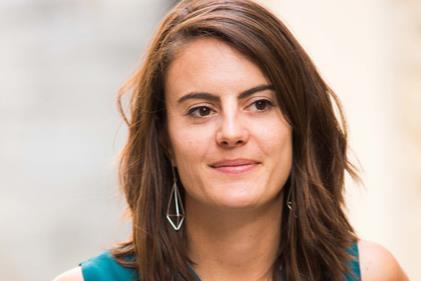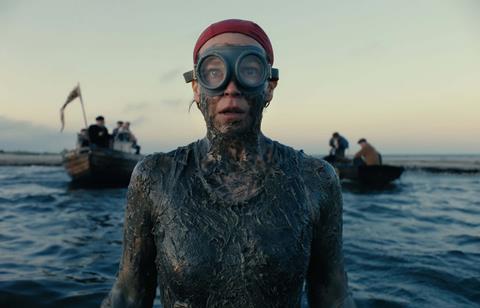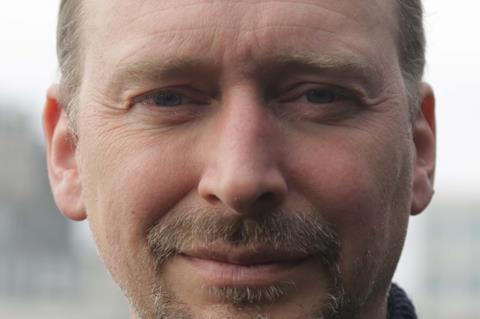The EU is seeking to boost financing for European filmmakers through its equity investment scheme and loan-guarantee facility. Screen finds out more.

Slowly but surely, the European Union (EU) is adapting the nature of its support for the film and TV industry. For years, Creative Europe’s Media programme has been the key EU support for filmmakers, helping films to travel beyond their national borders and find new audiences. But it has not directly supported production, preferring to leave this role to EU national governments.
Alongside Creative Europe, the EU is now trying to encourage greater investment into European film and TV production. At a time of acute film and TV funding challenges, it wants to spur the production of more and bigger European projects that can compete on a global stage.
The EU also wants to bolster the size, competitiveness and international reach of European film and TV companies. It is increasingly worried the media landscape in Europe is dominated by US players — not just the studios and streamers but also private equity firms such as KKR, which is a financial backer of Paris-based production and distribution giant Mediawan.
The move fits with the EU’s strategic priorities: European Commission president Ursula von der Leyen is prioritising investment in her second term to urgently turn around the region’s sluggish economy.
The EU is providing investment support for the film and TV industry in two distinct ways. The first is through the European Investment Fund (EIF)’s MediaInvest equity investment programme. The second is via debt-guarantee lines targeted at film companies from EIF’s InvestEU Cultural and Creative Sector (IEU CCS) guarantee. Both represent a departure from the subsidy model that has long underpinned the European film industry.
These investment tools have been welcomed by many in the European film and TV industry. But they have sparked concerns too. Some worry that the EU wants to support commercial movies at the expense of arthouse films. Others fear they mark a switch in focus from the current Creative Europe Media programme, which runs until 2027. The EU is currently consulting on the future of Creative Europe.

“As long as the European Investment Fund is able to support a broad breadth of companies, that is of course to be welcomed,” says Robert Heslop, secretary general of the International Federation of Film Distributors’ and Publishers’ Associations (FIAD). “But it should go hand in hand with the Media Programme. It certainly shouldn’t be a substitute for it.”
Others question the transparency of the schemes: MEP Emma Rafowicz, vice chair of the European Parliament’s Committee on Culture and Education, wrote to the Commission in February saying it was difficult to assess MediaInvest’s track record as little information had been provided about its investments since 2023.
MediaInvest fund
The €200m ($217m) MediaInvest equity fund was launched with some fanfare at the 2022 Cannes Film Festival by the then EU internal market commissioner Thierry Breton, but has taken a while to get going. Just over a third — €70m ($76m) — of its budget is taken from Creative Europe’s Media programme.

“MediaInvest will invest in a series of individual funds focused on audiovisual content production and distribution, as well as the videogame industry,” says Nathalie Chollet, head of circular economy and industrial resilience at EIF. “By doing so, MediaInvest hopes to spur more institutional and private investors to commit money to the sector.”
MediaInvest’s stated aim is to attract another €400m ($434m) of investments into the European audiovisual industry from institutional and private investors over a seven-year period. Its first investment was announced in 2023: €25m ($27m) into alternative investment fund Logical Content Ventures (see below). Run by Paris-based Logical Pictures Group (parent company of sales outfit Pulsar Content and distributor The Jokers Films), the fund has a slate-financing deal with Pathé and also invests in individual films. It aims to raise €70m-€80m ($76m-$87m) in total. So far, it has committed to 25 films including The Count Of Monte Cristo and Emilia Pérez (both via the Pathé deal) and plans to invest in 80-120 films by 2029.
MediaInvest announced another two investments at the end of February. It committed €25m ($27m) to Finland-based fund IPR.VC (see below) for its third fund focused on film and TV, which aims to have raised €120m ($130m) when it closes later this month. IPR.VC has long-term slate deals with US-based A24 and XYZ Films and European players such as France’s mk2 Films and Finnish animation firm Gigglebug. MediaInvest also announced a €20m ($22m) investment in a Swedish fund focused on the gaming industry.
Coming up, MediaInvest is also set to announce funding for the Paris-based Axio Together Fund, run by former European Producers Club managing director Alexandra Lebret, which will provide equity investment for production companies across Europe to help them scale up.
Scaling up
MediaInvest’s commitment to the Logical Content Ventures fund came after many months of discussions and due diligence. In part, that was because investing into a film fund was a brand-new step for EIF.

Logical Pictures president Frédéric Fiore says MediaInvest’s backing has been crucial for attracting other investors to the fund, including French pension funds and insurance companies. It has acted like a stamp of approval, helping to validate a fund that operates in the film financing arena, a sector viewed as risky and exotic by many investors. “On the fundraising side, it has been very helpful,” says Fiore. “It has led to a lot of new discussions with institutions. Last week we confirmed a big institution into the fund. They told us we don’t need to do any due diligence because they trust the EIF due diligence.”
Among its investments, Logical has backed two films co-produced by Germany’s Augenschein Filmproduktion: survival thriller The Dive and Berlin-set A Sacrifice. Augenschein co-founder Maximilian Leo describes MediaInvest as a “great programme to initiate a change” in the European industry. He believes it will help make European producers to think more commercially “about movies so they are like products that have a recoupment chance in order to attract investment”.
Leo believes the EU is taking the right step. “Instead of cutting funding, they are putting additional money into financial intermediaries to professionalise the commercial side of the movie [sector]. They are not saying, ‘We don’t support arthouse movies anymore.’ It just means people who are working on more commercial films don’t have to work only with Americans. And it’s not like [the EU] is subsidising them. They are profiting from them.”
Lending guarantees
EIF’s other form of support to European film companies is via debt guarantee lines through the InvestEU Cultural and Creative Sector (IEU CCS) guarantee. The somewhat dry IEU CCS acronym masks an important EU debt-financing instrument focused specifically on the creative sector, which often struggles to secure loans. For many banks, film companies are viewed as high risk and lacking the collateral needed to guarantee loans.

The IEU CCS guarantee does not provide lending direct to filmmakers — rather, it provides debt guarantees to a series of banks or other intermediaries across the EU so they can feel confident in lending to film and TV productions. The IEU CCS guarantee will share the risk with the lending institutions in case of defaults and will help to cover up to 70% of losses. “It is not the financing providers who are benefiting, it is the market players,” says Romana Stanciukaite, transaction and relationship manager at EIF.
The IEU CCS guarantee was launched to encourage more institutions to lend to the creative sector — and at better terms. This could mean banks offering lower interest rates than specialist film lenders, longer loan terms, or reducing or waiving collateral requirements.

“We want to make sure companies from the cultural and creative industries can easily find a source of debt financing which is also accessible at better conditions,” explains Andreea Draghici, head of national promotions institutions and sector policies unit at EIF.
The loans can be used for various activities — from cash-flowing a tax credit to financing a minimum guarantee (MG) against future sales. Ultimately, it might mean a producer is able to hold onto their ownership of a project rather than signing it away to secure financing. “There is a market need for IEU CCS products,” says Stanciukaite. “The creative industries usually don’t have tangible assets or predictable cashflows that a standard bank can understand. So they are unwilling to lend.”
Debt deals
Since 2022, EIF has signed IEU CCS guarantee deals with 45 European intermediary banks or institutions. Its first deals were announced in 2023 at San Sebastian International Film Festival with Spanish financing institutions Compañia Española de Reafianzamiento (CERSA) and CREA respectively. At last year’s Cannes Film Festival, it unveiled deals with France’s Institut pour le Financement du Cinéma et des Industries Culturelles (IFCIC), Germany’s Beta Film and the Finnish Impact Film Fund. Other intermediaries include Triodos Bank, Germany’s IBB and Bürgschaftsbank Baden-Wuerttemberg, and Italy’s UniCredit. The guarantees are expected to lead to more than €2.2bn ($2.4bn) of financing for creative industry small and medium-sized enterprises.
To date, 1,000 loans have been offered by the 45 intermediaries to creative companies. Nearly half of the loans (45%) have gone to audiovisual companies and the average loan size is €400,000 ($433,000). Notably, most of the loans (79%) have gone to companies with fewer than nine employees — traditionally those that find it difficult to borrow.
The biggest uptake has been in Spain (35% of the loans), Italy (26%), France (16%) and Portugal (11%). The maximum loan size that can be agreed is €7.5m ($8.1m). By providing guarantees for institutions to lend to film companies, EIF not only hopes it can attract more lenders to the sector but also that they will become more comfortable lending to the sector in future. As with so much of the EU’s focus, it is all about encouraging investment and growth.
Case study: Logical Content Ventures

The Logical Content Ventures fund marked something of a pilot project for the EIF MediaInvest programme. Announced at San Sebastian International Film Festival in 2023, EIF has committed €25m ($27m) to the fund.
Logical Pictures previously ran a content fund from 2017-21 that invested in 20 films, around 70% of them European. “We strongly believe there is a lot of value in European content,” says Logical Pictures president Frédéric Fiore, who explains that generous national funding and incentives for European films “allows us to offset a share of risk for investors”.
So far, the Logical Content Ventures fund has supported 25 films, of which 17 have been made. Most have come through a slate-financing deal with Pathé that includes titles such as The Count Of Monte Cristo, Emilia Pérez and Emmanuelle. The Pathé deal ran until the end of 2024 (although Pathé titles that Logical backed before then — such as upcoming action thriller 13 Days, 13 Nights — In The Hell Of Kabul and biopic De Gaulle — will be released over the next few years).
The Pathé deal has helped to bring “very solid titles in terms of library value” to Logical, says Fiore. But now the fund is moving away from its Pathé deal towards financing films with different companies on a picture-by-picture basis. Doing so is both more rewarding, safer and more profitable, according to Logical Content Venture’s director of investments Céline Dornier. “We’re also producers,” she says. “We feel like we know production and the market well enough to do this selection by ourselves. And it’s more interesting — it’s closer to co-producing.”
“We can mitigate the risk better when we can also have leverage with the producer,” adds Fiore. “We can negotiate back-ups. So the basic performance in the short term is better on direct investment usually than with slate deals.
“For us, it’s also very important to be a driving force in this European emergence of voices — whether it’s new voices or already-powerful voices — and bringing them to international [recognition].”

Dornier says Logical is looking to back more “internationally” focused EU films rather than the mainly French films that fell under the Pathé deal (she stresses EU, rather than European, as one of the requirements of EIF, which rules out majority-UK features). It is also focusing more on genre movies and bigger-budget titles.
Logical is not just looking to back commercially focused film. “We also believe that arthouse films, especially those that play with the code of genre, can be very good investments,” says Fiore, citing Palme d’Or winners such as Anora, Parasite and Anatomy Of A Fall. At least 25% of its investments will go into first features.
Logical invests between 10%-25% of the budget, and backs films with budgets of between €3m-€15m ($3.3m-$16m). For example, it invested €1m ($1.1m) in Maximilian Erlenwein’s 2023 survival thriller The Dive, which had a €10m ($11m) budget, and €500,000 ($542,000) in Jordan Scott’s Berlin-set A Sacrifice, which had a €5m ($5.4m) budget. Other individual films it has invested in include 2022 drama Tchaikovsky’s Wife and 2023 horror Night Of The Hunted.
In total, Logical receives about 800 applications for funding a year, and will invest in around 10-15 pictures annually. “We are very highly selective,” says Fiore. He says Logical’s first fund delivered a 10% rate of return for investors; for this fund, it is targeting 10%-15%.
Case study: IPR.VC

MediaInvest’s most recent commitment was to Helsinki-based alternative investment fund manager IPR.VC for its IPR.VC Fund III, which has so far raised €100m ($108m) to invest in film and TV production. IPR.VC has invested in film and TV content since 2015. To date it has raised €200m ($217m) across three funds from Nordic institutional investors, pension funds and family offices.
It has supported 50 productions through its slate deals with the likes of A24, XYZ Films and mk2 Films, among them Civil War and Blackberry. Most recently, it has supported a number of US titles that have shot in Europe including David Lowery’s Mother Mary, starring Anne Hathaway and Michaela Coel, which filmed in Germany, and A24’s first family film TheLegend Of Ochi, shot in Romania.

“There’s a lot of interest from US players to do more in Europe because of the talent, cost structures and tax incentives,” says IPR.VC co-founder and managing partner Timo Argillander.
So far, the funds have been very US-focused, but the EIF commitment means more can be made with European companies and talent. Argillander says the EIF investment “coincides with our intention to do more things in Europe… we intend to diversify so there is much more European content in our portfolio.”
Asset class
Among recent investments is Iceland-set crime series Hildur, based on the novels by Satu Ramo. Argillander says IPR.VC hopes to announce a couple more film-focused slate deals at Cannes with European companies.
The executive adds that the EIF backing — which again came with extensive due diligence — “legitimises that film and television done in a right manner is a professional asset class”. He also hopes it will extend the range of investors that work with IPR.VC. “So far we have been backed by Nordic institutional and professional investors and our plan is to open up the funds for other international investors.”
He stresses that IPR.VC operates “very standard, regulated private equity funds, which means it’s possible for bigger institutions to diversify with investments in film and TV”.
As such, he distances it from UK film investment schemes that offered investors tax relief for putting money into films, and led to investors being chased by HMRC for tax avoidance. “We decided we are not using any investor tax incentives in what we do. This is a purely commercial proposition. There are tax benefits on the production incentive level when we invest, but we have not built them into the funds, which makes them more predictable.”
Like Logical Pictures’ Fiore, Argillander pitches a film and TV fund like IPR.VC as a way for investors to diversify. He adds that the nature of film and TV funding means capital will return back to investors much more quickly than from traditional private equity funds. He also thinks that consumers’ ever-growing appetite for content makes film and TV a good investment.
Case study: Velvet Films

Belgian producer Velvet Films is a recent beneficiary of InvestEU’s Cultural and Creative Sector Guarantee (IEU CCS).
Velvet was the Belgian co-producer on Frida Kempff’s The Swedish Torpedo, which world premiered last year at Toronto. The film shot largely in Estonia, which offers a 30% tax credit. Velvet Films producer and founder Sebastian Schelenz was turned down when he went to his house bank to cashflow the €600,000 ($650,000) tax credit for the film. The Estonian tax credit, even though paid out by the Estonian Film Institute (EFI), was “too exotic” for his bank, says Schelenz. “It was unknown to them.”

So Schelenz turned to Triodos Bank, which has a debt guarantee agreement with IEU CCS. For Triodos, having the Estonian Film Institute as a counter party was enough of a guarantee for them to lend €600,000 to cashflow the tax credit. The loan helped to cover production expenses in Estonia for The Swedish Torpedo, which shot from August-October 2023. The Estonian Film Institute paid it back in December 2023.
Working with Triodos was beneficial for a number of reasons. Schelenz suggests the interest he paid — Euribor plus 450 basis points — was arguably about 1% cheaper than with traditional European film lenders such as Coficiné and Cofiloisirs. Crucially, the credit costs were also eligible for the 40% Belgian tax shelter. “That is a real game-changer,” he adds.
The deal terms were also more flexible than with traditional lenders. “There is no fixed date set for the payback, which takes into account the way our industry works.”
Perhaps most importantly, Schelenz did not have to provide collateral or a personal guarantee against the loan, when many producers have put their house on the line. “For me, that is unheard of with Coficiné and Cofiloisirs. They will always want you as a company owner to sign a personal guarantee.”
Case Study: Minimum guarantees from Beta Film

Beta Film was announced in Cannes 2024 as one of the intermediaries to be supported by the InvestEU Cultural and Creative Sector (IEU CCS) guarantee.
The deal allows Beta to offer minimum guarantees (MGs) against future sales to a portfolio of film and TV projects. In case the MGs are not met, The IEU CCS guarantee will — under certain conditions — cover between 30% and 70% of the losses of a portfolio project.
Jan Wünschmann, Beta Film’s EVP of co-production and business affairs, says the guarantee is an important tool to strengthen the production landscape of Europe and intercultural connection. To a certain extent, it also allows Beta to take more risk on more projects and bigger projects.
This is important when inflation and falling broadcaster and streamer spend are making it more difficult to finance big-budget projects that can travel internationally. “There is a shortfall of financing in the current market,” says Wünschmann. “We need strong soft money systems in European countries and reliable partners on the broadcast and streamer side. This EIF scheme is an additional element. The EIF guarantee can make an important contribution to make projects better, increase the number of strong and relevant projects within Europe and help internationalise projects — preferably all three.”
Under the terms of its IEU CCS deal, Beta can only provide MGs to small- and medium-sized enterprises. Production companies belonging to bigger European groups, like Beta, are likely not applicable.
“It’s a pity,” says Wünschmann. “Of course, we want this tool to support small independent producers. But we also believe it’s important to strengthen the European audiovisual market by supporting projects that can travel globally and compete with US projects, like Babylon Berlin, Gomorrah or The Swarm, which are not always but often produced by companies that are part of a group.”







![The Brightest SunScreen[Courtesy HKIFF]](https://d1nslcd7m2225b.cloudfront.net/Pictures/274x183/3/5/0/1448350_thebrightestsunscreencourtesyhkiff_312678.jpg)

















No comments yet